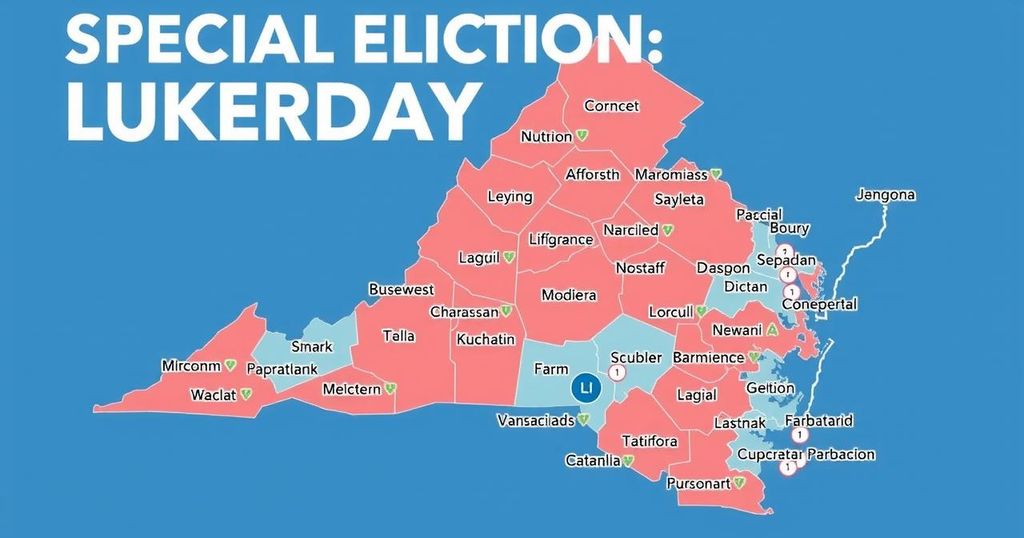Special Elections in Loudoun County: A Crucial Political Decision Ahead

Voters in Loudoun County and central Virginia will cast ballots in special elections for two state senators and a House delegate on the eve of the General Assembly session. While Republicans face challenges in flipping seats, unexpected outcomes are possible due to low turnout. The results might significantly empower the legislative agenda of Governor Glenn Youngkin in his final year. Candidates present starkly contrasting views on important issues including abortion and education.
On Tuesday, voters in Loudoun County and parts of central Virginia will participate in special elections to fill two state senator seats and one delegate position ahead of the General Assembly’s session commencing on Wednesday. Notably, Republicans can potentially gain control of the House and Senate by securing victories in Loudoun, although political experts consider this scenario unlikely due to the region’s Democratic stronghold. Conversely, Democrats face challenges in expanding their Senate majority following the departure of Senator McGuire, particularly in the predominantly red, rural areas from Richmond to Lynchburg.
Despite the daunting prospects for both parties, special elections have historically yielded unexpected outcomes owing to typically low voter turnout, which may prove advantageous for Republicans. Gains in either legislative chamber could significantly support the agenda of term-limited Governor Glenn Youngkin during his final year in office. The Senate, currently holding a narrow Democratic majority, stands at 21–19, and control may shift if Democrats fail to retain the vacated seat. Before Del. Srinivasan’s resignation takes effect, Democrats hold a 51-to-49 advantage in the House, but this could prompt a power-sharing scenario if Republicans secure that seat.
Early voting for the Loudoun elections commenced on December 11, while central Virginia initiated early voting on December 27. Polling will be conducted from 6 a.m. to 7 p.m. on Tuesday. In the contest for the Loudoun Senate seat, Democratic Del. Kannan Srinivasan is contending against Tumay Harding, a former educator with a strong stance against Loudoun’s school policies. Srinivasan emphasizes his legislative accomplishments and positions himself as an advocate for mental health and consumer protection. Conversely, Harding positions her campaign against what she perceives as extreme leftist agendas in Richmond.
The candidates’ positions diverge markedly on abortion policies, with Srinivasan labeling himself as a bulwark against restrictions on reproductive rights, while Harding asserts that life begins at conception and supports current abortion restrictions. In the race for the House seat vacated by Srinivasan, Democrat JJ Singh, a former economic adviser, and Republican Ram Venkatachalam, an IT consultant, are contending for the position.
Against the backdrop of central Virginia elections, Republican nominee Luther Cifers, a new entrant to politics and leader of a kayak fishing company, is facing Jack Trammell, a seasoned candidate and current university professor. Both candidates share a commitment to issues pertinent to their constituencies, with Cifers focusing on education and affordable housing, and Trammell advocating for rural entrepreneurship and enhanced public services. These special elections not only set the stage for immediate legislative outcomes but may also have lasting implications for future governance in the state.
The upcoming elections in Loudoun County and central Virginia are pivotal as they occur just before the commencement of the General Assembly session, impacting both local governance and state legislative dynamics. With the potential for Republicans to gain control of the House and Senate by winning certain seats, these elections draw considerable attention from political observers. The context is marked by a narrow majority held by Democrats in the Senate and a precarious control in the House following recent political changes. Historical patterns show that low turnout in special elections can lead to unexpected results, adding an element of unpredictability to the outcomes. Both parties’ nominees are framing their campaigns around urgent local issues, thus showcasing diverging philosophies on governance and social policies, particularly on contentious issues such as abortion and education, which resonate deeply within the electorate.
The special elections in Loudoun County and central Virginia highlight a critical juncture for Virginia’s political landscape, with potential repercussions on both statewide agendas and local governance. Despite the challenges faced by both parties, especially in a predominantly blue region, the outcomes may surprise given the unique characteristics of special elections. Control of the Senate and House hangs in the balance, influencing the trajectory of key legislative priorities. As candidates advance distinctly opposite viewpoints on pressing topics like reproductive rights and educational policies, voters are presented with a clear choice that could reshape representation in the General Assembly.
Original Source: www.washingtonpost.com







